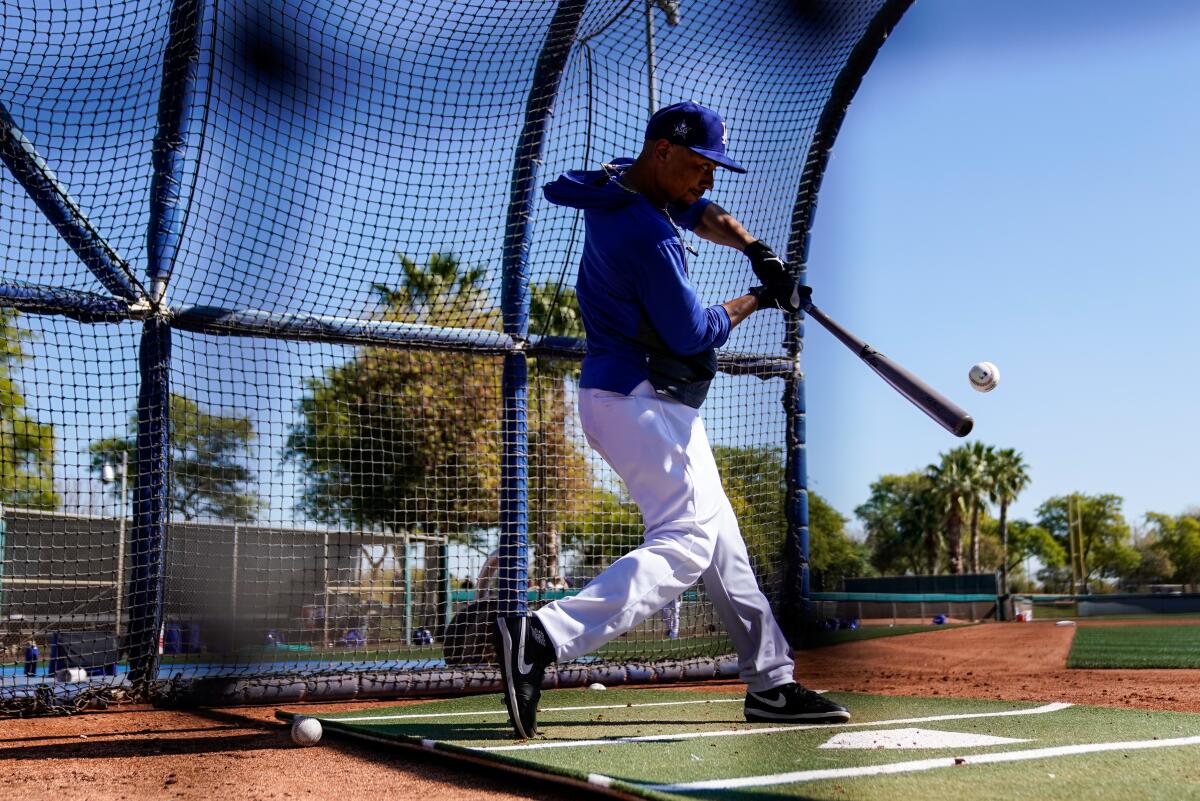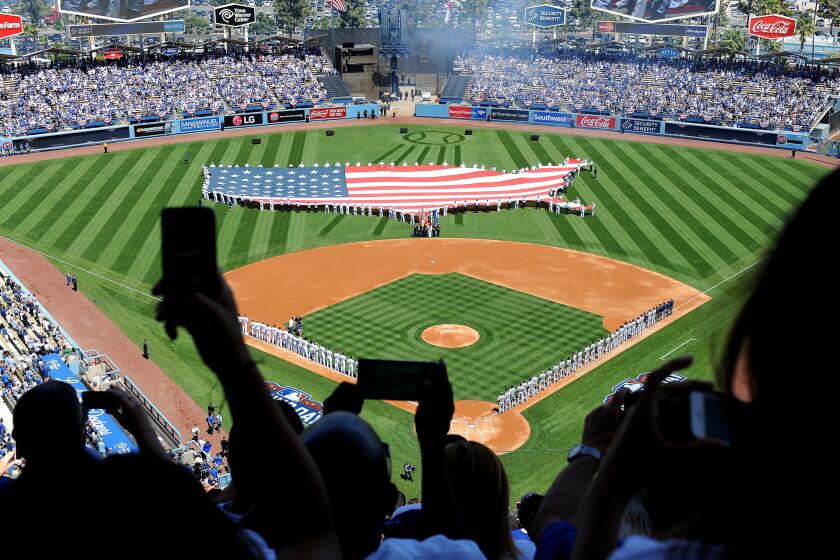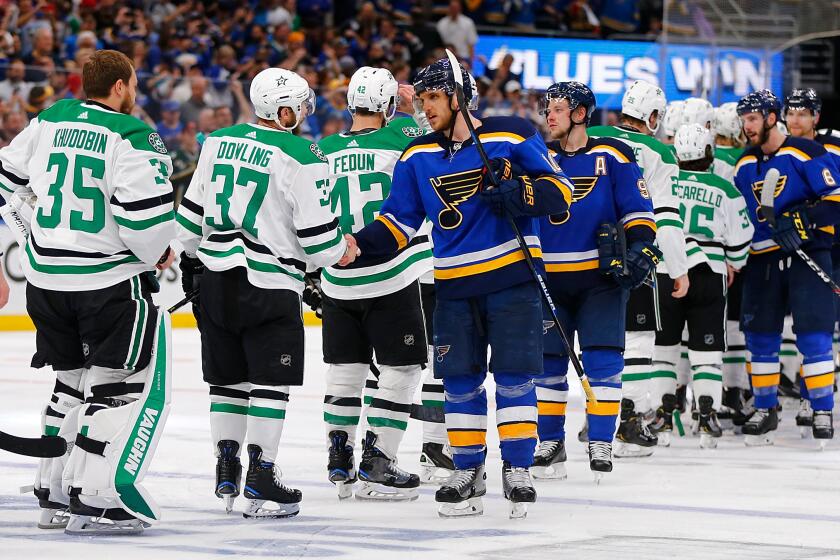Here’s how much California stands to make from fan-free MLB games

- Share via
On May 11, the day major league owners approved a plan to start the season in early July, Gov. Gavin Newsom declined to endorse the proposal.
“We’ll see where we will be in July,” Newsom said that day.
On May 18, Newsom said baseball and other pro sports would be invited to play within California “in that first week or so of June,” with no fans allowed, and with the approval of public health officials.
There is a dollar figure that can be attached to the change in plans. In a state with a budget battered by the coronavirus-induced recession, allowing California’s five major league teams to stage home games rather than forcing them to play elsewhere would compel baseball players to contribute about $73 million to the state treasury.
Almost all states assess a so-called “jock tax,” charging athletes income tax for every day they work in the state. California’s 13.3% rate is the highest in the country.
State analysts this month projected a $54-billion deficit, the worst in state history. Newsom “definitely” had to consider allowing games in the state so as to collect the jock tax, said Dan Schnur, communications director for former Gov. Pete Wilson.
“Out-of-state multimillionaire athletes are a pretty easy target,” said Schnur, who teaches political strategy at USC. “Before he starts raising taxes on Californians, the jock tax is a much more politically acceptable alternative.”
If the 2020 season had been played in full, the state could have generated about $143 million in taxes from baseball players, according to Jeffrey Becker, partner at Winningham, Becker and Co. in Woodland Hills. Becker, who calculated estimates for The Los Angeles Times, said the state would have generated just $28 million had MLB played its proposed 82-game season entirely out of state, with income tax payments limited to players that call California their primary residence.
Becker’s revenue estimates could change depending on the number of games played within California, possible postseason games, the number of players on an expanded roster and taxi squad, and any salary reductions and postseason revenue splits agreed upon by players and owners. In all, the difference in estimated jock tax revenue between MLB games out of state and within the state this season accounts to about two-thousandths of the state’s current $215-billion budget.
However, that $45 million difference would cover the annual budget for the California Coastal Commission, or for state-owned Exposition Park in Los Angeles, home to the California Science Center and the California African American Museum.
Players are reviewing MLB’s 67-page plan to protect them from the coronavirus. Here’s everything you need to know about how it will change baseball in 2020.
That amount could be critical, with the NBA and NHL each considered likely to finish its season out of state. Had the Lakers and Clippers played one another in the Western Conference finals, the state would have benefited from as many as 27 NBA postseason games at Staples Center.
As recently as 2013, the California jock tax generated more than $229 million from all sports, according to a 2015 article in the San Diego Union-Tribune. The state’s Franchise Tax Board “no longer compiles these statistics,” said spokeswoman Denise Azimi, preferring to aggregate taxes paid by all non-residents.
The governor’s office declined to say whether the prospect of losing out on $45 million in athlete taxes made him more receptive toward permitting games within the state. Newsom announced his willingness to allow games sooner on the first business day after MLB released a 67-page health and safety protocol, and even as state officials noted that public health officials would make the final call in each respective county.
However, as outbreaks of the virus recede in some parts of the state and preparedness for a potential second wave increases, Newsom is gradually implementing a reopening plan.
“This reopening is consistent with our focus on overall community health,” an official said, “which must balance health burdens from COVID-19 disease and the morbidity and mortality related to economic and social burdens associated with a shuttered economy and education system.”
Newsom last month appointed scores of executives and labor leaders to a task force on business and jobs recovery. The members include AEG President Dan Beckerman; Dodgers, Golden State Warriors and LAFC co-owner Peter Guber; and Times owner and Lakers limited partner Dr. Patrick Soon-Shiong. Guber said he had been asked to refrain from comment on the work of the task force.
However, Schnur said he expected that the task force would stress to Newsom the urgency of bringing back sports, and not just for the relatively small amount of tax dollars paid by athletes. In a 2019 study commissioned by the Los Angeles Sports Council, the county’s economic development corporation estimated that sports teams and events in Los Angeles and Orange counties generated 39,000 jobs and state and local taxes totaling $328 million.
The coronavirus outbreak has athletes and medical experts from all over the world wondering how good sportsmanship can be embraced without shaking hands.
“One of the entertainment industry’s strongest talking points for years has been the working class employees who don’t show up on camera,” Schnur said.
“Nobody wants to give a tax break to a wealthy actor, but the entertainment industry has argued very effectively on behalf of its lower-wage workers. I wouldn’t be surprised at all if some of the sports’ representatives on Newsom’s task force were making the same case now.”
And, for now, Schnur said allowing games could be a politically savvy move for Newsom, even if fans are not allowed to attend.
“The additional revenue is important, but the public message that holding sports events would send may be even more politically beneficial for Newsom,” Schnur said. “Over the last few weeks, there have been protests all across the state, by restless citizens wanting to get out of their houses. Newsom has done a pretty good job of walking the line between forbidding public activity and discouraging it.
“Major league baseball games over the summer, even without fans, would do a lot to calm people down and ease the political pressure on him.”
More to Read
Go beyond the scoreboard
Get the latest on L.A.'s teams in the daily Sports Report newsletter.
You may occasionally receive promotional content from the Los Angeles Times.













